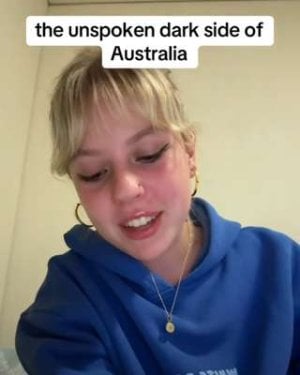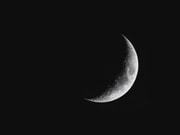Expat opens up about 'very Australia-specific issue' online: 'Australia, I still love you'
By
Danielle F.
- Replies 0
As a nation celebrated for its sun-kissed beaches, friendly locals, and laid-back lifestyle, Australia is the epitome of a carefree and open society.
However, a young expat living and studying in The Land Down Under sparked a significant conversation by shedding light on an 'unspoken dark side' of Australian culture.
British student Eloise Juliet faced a media storm after her candid observations about Australia's social issues.
Despite the backlash, she maintained her affection for the country.
'Australia, I still love you even if you don't love me anymore,' Eloise prefaced.
In a video she posted online, Eloise described a troubling lack of emotional availability, which she believed was a 'very Australian-specific issue'.
According to her observations, men often act 'strangely towards women' and 'treat them like objects'.
'It's just a lot worse here,' she stated, prompting a public discourse online.
In light of the discussions it sparked, Eloise has declared that she would no longer address the issue.
However, she clarified that she only wanted to 'make other people who have had that same experience as me feel less alone'.
'And maybe just spark some conversation among people about why this is happening and what we could do about it', Eloise added.
The response to Eloise's claims has been mixed.
Some Australians criticised Eloise and her perspective and suggested it may be a misunderstanding.
However, a group of people echoed sentiments similar to hers.
'Your video made me feel very heard. I moved to the Gold Coast last September at 18 and also went to university here, but I am moving back to England in June,' a commenter wrote.
Others also agreed that there has been a 'sharp divide between the sexes' and a general lack of emotional vulnerability among Australians.
Watch Eloise Juliet's full video here:
Source: @eloise_juliet/TikTok
In 2023, another expat who lived in Australia for 15 years went viral for an essay that highlighted similar issues.
The essay pointed out a stark gender divide and a casual approach to social commitments.
They also likened the experience to living in the 1970s.
These stories came at a time when issues about violence against women have not been prominent in the lead-up to the federal election.
This switch-up was in contrast to the last federal election, where the topic was more visible.
Then-Prime Minister Scott Morrison refused to meet with women outside the parliament during the Justice rallies last 4 March.
Independent MP Zoe Daniel recently questioned why violence against women is not a significant talking point.
According to statistics, more than one woman is killed every week in the country.
A survey by Plan International Australia also revealed a disconnect between the perception and reality of gender equality in Australia.
While 60 per cent of respondents believe the nation is close to achieving gender equality, stories about the gender pay gap, workplace discrimination, and under-representation of women in leadership positions tell a different story.
The survey also indicated that 30 per cent of Australians feel there is a 'war on men', highlighting the topic's complexity.
Eloise Juliet's experience and the subsequent discussion it sparked should be a reminder that beneath the surface of Australia's sunny disposition lies a more complex social landscape.

Do you feel the same sentiments as Eloise Juliet? Do you believe this is a significant cultural problem that needs to be addressed? Share your thoughts and opinions about this story with us in the comments section below!
However, a young expat living and studying in The Land Down Under sparked a significant conversation by shedding light on an 'unspoken dark side' of Australian culture.
British student Eloise Juliet faced a media storm after her candid observations about Australia's social issues.
Despite the backlash, she maintained her affection for the country.
'Australia, I still love you even if you don't love me anymore,' Eloise prefaced.
In a video she posted online, Eloise described a troubling lack of emotional availability, which she believed was a 'very Australian-specific issue'.
According to her observations, men often act 'strangely towards women' and 'treat them like objects'.
'It's just a lot worse here,' she stated, prompting a public discourse online.
In light of the discussions it sparked, Eloise has declared that she would no longer address the issue.
However, she clarified that she only wanted to 'make other people who have had that same experience as me feel less alone'.
'And maybe just spark some conversation among people about why this is happening and what we could do about it', Eloise added.
The response to Eloise's claims has been mixed.
Some Australians criticised Eloise and her perspective and suggested it may be a misunderstanding.
However, a group of people echoed sentiments similar to hers.
'Your video made me feel very heard. I moved to the Gold Coast last September at 18 and also went to university here, but I am moving back to England in June,' a commenter wrote.
Others also agreed that there has been a 'sharp divide between the sexes' and a general lack of emotional vulnerability among Australians.
Watch Eloise Juliet's full video here:
Source: @eloise_juliet/TikTok
In 2023, another expat who lived in Australia for 15 years went viral for an essay that highlighted similar issues.
The essay pointed out a stark gender divide and a casual approach to social commitments.
They also likened the experience to living in the 1970s.
These stories came at a time when issues about violence against women have not been prominent in the lead-up to the federal election.
This switch-up was in contrast to the last federal election, where the topic was more visible.
Then-Prime Minister Scott Morrison refused to meet with women outside the parliament during the Justice rallies last 4 March.
Independent MP Zoe Daniel recently questioned why violence against women is not a significant talking point.
According to statistics, more than one woman is killed every week in the country.
A survey by Plan International Australia also revealed a disconnect between the perception and reality of gender equality in Australia.
While 60 per cent of respondents believe the nation is close to achieving gender equality, stories about the gender pay gap, workplace discrimination, and under-representation of women in leadership positions tell a different story.
The survey also indicated that 30 per cent of Australians feel there is a 'war on men', highlighting the topic's complexity.
Eloise Juliet's experience and the subsequent discussion it sparked should be a reminder that beneath the surface of Australia's sunny disposition lies a more complex social landscape.
Key Takeaways
- A British expat in Australia sparked a conversation about the perceived 'dark side' of Australian culture, explicitly pointing out emotional unavailability.
- Despite facing criticism for her views, Eloise Juliet maintained her love for Australia but hoped to bring awareness to the issues she encountered.
- The topic of gender inequality has been notably absent from significant discussions in the lead-up to Australia's federal election.
- The Plan International Australia Gender Compass survey highlighted a disconnect between the perception of gender equality in Australia and the reality.








